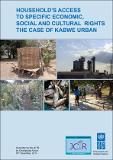| dc.contributor.author | Chompolola, Abson | |
| dc.date.accessioned | 2020-09-23T11:08:06Z | |
| dc.date.available | 2020-09-23T11:08:06Z | |
| dc.date.issued | 2014-12-07 | |
| dc.identifier.citation | Chompolola, A. (2014). Household's Access to specific Economic, Social and Cultural Rights: The Case of KabweUrban. Lusaka, Zambia: Jesuit Centre for Theological Reflection (JCTR) | en |
| dc.identifier.uri | https://repository.jctr.org.zm/handle/20.500.14274/96 | |
| dc.description | The JCTR is a faith based organisation whose main area of focus is education and advocacy for improved standard of living among the poor. To strengthen its education and advocacy work, the JCTR conducts research in various aspects of society that have an effect on people’s lives. The research is aimed at generating information for use in its educational programs as well as to inform its advocacy work. It is against this background that the JCTR in 2012 commissioned this study on access to Economic, Social and Cultural Rights (ESCRs). | en |
| dc.description.abstract | This report is one of three reports produced for phase I of the JCRT/UNDP project on access to ESCRs. ESCRs are socio-economic human rights which include the right to education, right to housing, right to adequate standard of living and the right to health. These rights are recognised and protected in international and regional human rights instruments and countries that subscribe to these human rights instruments have a legal obligation to respect, protect and fulfil economic, social and cultural rights; and are also expected to take “progressive action” towards their fulfilment. It was realised however that the extent to which these rights are realised in Zambia was extremely low and needed to be promoted. But there was a problem of sufficient reliable data on the status quo. The JCTR therefore, through its Social Conditions Programme, implemented this study focusing on the right to food, housing, health, education, employment and adequate standard of living. The study was conducted in Kabwe while the other two were conducted in Livingstone and Kasama. The indicators obtained in this study paint a picture on the degree of access to ESCRs and has a lot of implications on policy aiming at enhancing access to these ESCRs. | en |
| dc.description.sponsorship | United Nations Development Programme (UNDP) | en |
| dc.language.iso | en | en |
| dc.publisher | Jesuit Centre for Theological Reflection | en |
| dc.rights | Attribution-NonCommercial-ShareAlike 3.0 United States | * |
| dc.rights.uri | http://creativecommons.org/licenses/by-nc-sa/3.0/us/ | * |
| dc.subject | Human Rights | en |
| dc.subject | ESCR | en |
| dc.subject | Kabwe | en |
| dc.title | Household's Access to Specific Economic, Social and Cultural Rights: The Case of Kabwe Urban | en |
| dc.type | Other | en |

